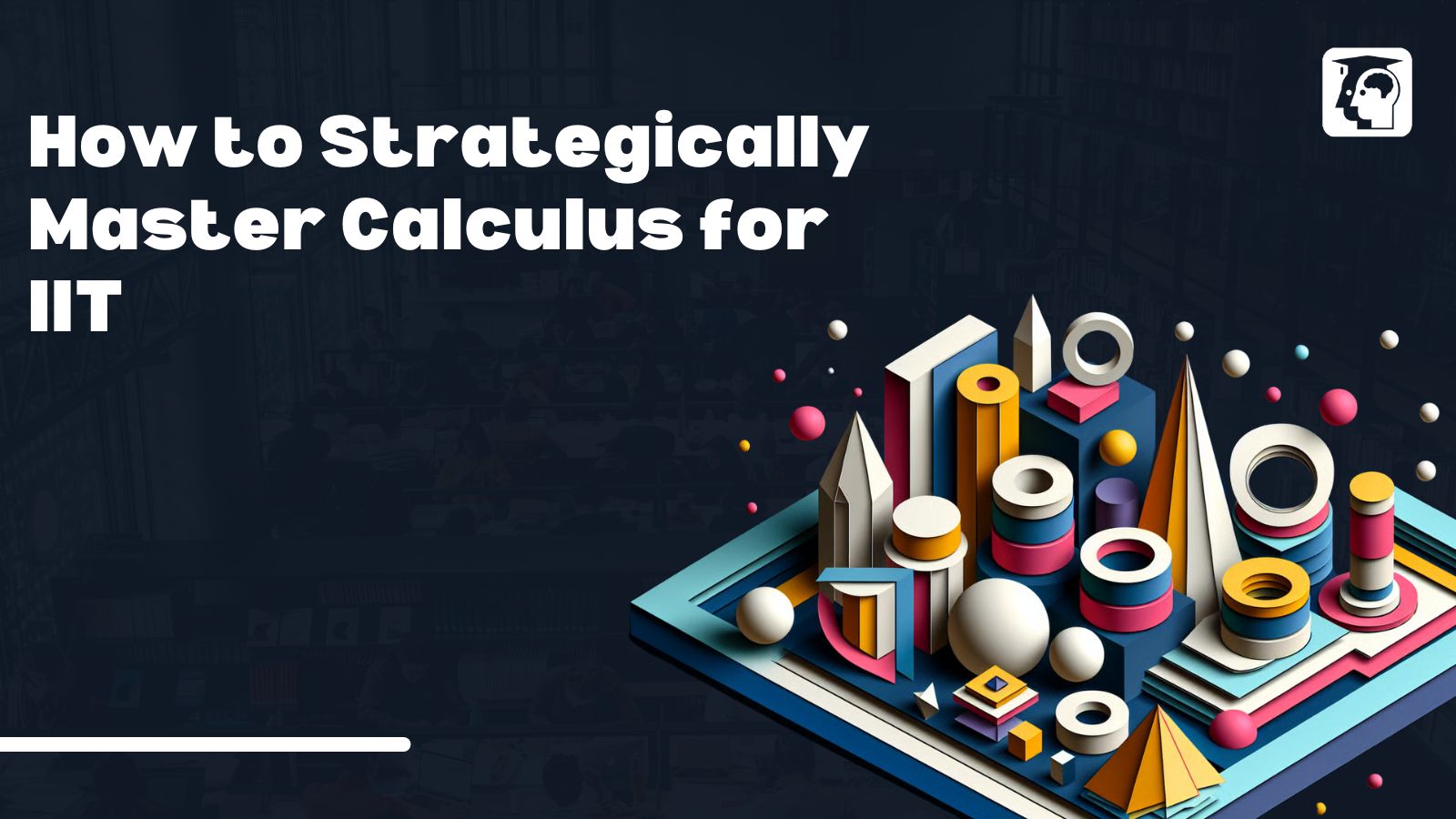Preparing for IIT-JEE is similar to preparing for a marathon. When it comes to chapters in the mathematics syllabus, Calculus is one topic that students tend to fall for if they love maths or fear if they hate maths. It is vast, abstract and scary at the same time. But here is the reality: calculus is also the most powerful weapon in your JEE arsenal (if you can manage it appropriately).
You may have grappled for a while with it—limits that seemed impossible, derivatives that went on forever, integrals that were becoming like an unsolvable riddle. But when you are on top of it, Calculus can become a high-scoring area for you to continually achieve excellent marks. However, how do you do this?
This blog is going to take you through a strategy to master calculus for IIT-JEE in a step by step manner. It doesn’t matter if you have just started or whether you are in the final stages of revision, this guide will help build your confidence, allow you to increase your accuracy and speed in the subject.
What is Calculus and Why is it Important for IIT ?
To start with, calculus is essentially about motion and change – it is the mathematics of CHANGE. Calculus is about how things change – for example how fast the car changes speed at a particular moment in time.
For IIT-JEE aspirants, calculus is one of the most crucial chapters within the math syllabus, as a considerable portion of the JEE is derived from calculus topics (30-40%). Here’s what you can expect to see from calculus-related topics in the JEE paper:
- Limits and Continuity
- Differentiation
- Application of Derivatives
- Integration
- Area under curves
- Differential Equations
And that’s only from the math portion! Calculus has a strong presence in the Physics section too, especially kinematics, electricity, and thermodynamics. Therefore, if you master calculus, you’re sure to indirectly see a spike in your physics marks too.
Strategic Approach to Mastering Calculus
In this guide, we provide a precise path to help students at Origin Educare go from zero to hero with calculus, through step-by-step mastery:
1. Reframe Your Mindset Around Calculus
Firstly, stop thinking of calculus as a monster; it does not work against you or tests you; in fact, it works to help you understand the world better. Derivatives measure speed or steepness and integrals measure area or accumulation. Once you understand the ‘why’, not simply the ‘how’ you will want to continue learning.
2. Build a Strong Foundation
Start with the basics:
- Familiarize yourself with the limits notion. Think of it as approaching a number without truly reaching it.
- Get clear on what it means for a function to be continuous and how that leads to differentiability.
- Recognize differentiation is the rate of change — it’s not just a mechanical act of application.
- Imagine integration as the summation of an infinite number of vanishing small values.
These foundations need to be in focus for you. Use real-life analogies for the notions and try to learn via graphs wherever you are able.
3. Divide the Syllabus and Conquer
Don’t try to cramp the entire Calculus syllabus at once. Break it down:
- Limits & Continuity
- Derivatives & Usage of derivatives
- Integration – Indefinite & Definite
- Area under Curves
- Differential Equations
Give each section the expected level of attention and time spent on it. Spend at least 1 – 2 weeks getting each separate section clear before putting a holistic picture.
4. Visualize Everything
Calculus is best understood visually …;;
- Tangent lines to see derivatives
- shaded areas to look at integrals & area-under-curves problems.
- Graphs to see how functions operate
5. Focus on Understanding Before Memorizing
Don’t just memorize formulas like:
ddx(sinx)=cosxor∫1xdx=ln∣x∣+C\frac{d}{dx} (\sin x) = \cos x \quad \text{or} \quad \int \frac{1}{x} dx = \ln |x| + Cdxd(sinx)=cosxor∫x1dx=ln∣x∣+C
Instead, understand what they mean and where they come from. Once you understand the derivation, you’ll never forget the formula.
6. Practice With Purpose
Quantity is important but quality is everything
For each concept:
- Answer 10–15 basic questions
- Finish 5–7 JEE Previous Year Questions
- Complete 3–5 tricky/high-level questions
After each question, ask yourself:
- Did I understand the concept?
- Did I take the correct approach?
- Will I get faster at solving this next time?
This kind of practice that includes reflection is what takes average students to the top.
7. Use Calculus to Strengthen Physics
This is probably one of the smartest strategies. As much as you can apply your calculus skills in Physicsar:
- Use derivatives in velocity/acceleration questions
- Use integration in work, energy and electric field questions
- Understand basic differential equations in heat transfer, and solve circuit problems
You will see your confidence in Physics improve, alongside your calculus skills.
8. Build Your Personal Formula Sheet
As you are studying, create a one page handbook that captures:
- All major formulae
- Shortcuts (or tricks) you find
- Common errors you’ve made…
Review this every weekend. In the last 2-3 months before your exam, this will be your best tool for rapid revision.
9. Practice Under Exam Conditions
Once you feel confident about a topic, you can do a timed test:
- Solve 7–10 questions in 30 minutes
- Following the JEE pattern by including objective & integer type questions
- Simultaneously focusing on speed and accuracy
This will build up your exam temperament, and help avoid careless errors, and help alleviate pressure.
10. Fix Your Weak Areas First
It is important to keep track of your errors:
- Are you missing limits?
- Missing the +C in an integration?
- Using the incorrect substitution?
List your areas of weakness and specifically plan to address them in your revision. Turn your weaknesses into strengths over time.
About Origin Educare: A Trusted Guide for Your IIT-Journey
At Origin Educare, we believe that hard work alone won’t help you succeed in JEE. Instead, we believe that working correctly is the key to success in JEE. Our teaching philosophy is oriented towards:
- First, you master your concepts – every student’s understanding of the “why” behind every formula
- Strategic planning – every week, we create a personal timetable focusing on practice, tests
- Doubt solving, mentoring and coaching – every doubt, no matter how trivial is a chance to grow
- Visual and application based learning – especially when your studying calculus, physics and other similar topics
Throughout our many years of experience with our students, we have seen their fears turn into strengths—and calculus has been an enormous part of that change.
Whether you have just made a start, or you are having a look at calculus prior to your JEE Advanced preparations, we are happy to help you out.
Conclusion
Calculus is not only a simple chapter, it is also a way of thinking. It shows you how to think logically, allows you to visualise change and shows you how to analyse motion. You don’t need to be a genius to learn calculus, you need to be consistent, methodical and able to learn.
At Origin Educare, we have seen many students go from being scared of calculus to making it their favourite part of the JEE syllabus. You can do this as well. It may be a tough road, but once you learn calculus, you will become far more confident not only with your Math, but your other subjects as well.
We see your dream of IIT coming closer, let calculus be the ladder that lifts you one step closer to achieving that goal!
Ideally from class 11, once comfortable with algebra and functions. However, it is never too late if you have a proper plan.
NCERT is good for the basics but should not be relied on for proper JEE level practice questions. You should use books such as G. Tewani, Arihant or Cengage for practice at this level.
Very. Calculus is deeply visual. Understanding graphs improves accuracy and speed in problem-solving.
No. All topics are interlinked. Differential equations appear in both Math and Physics, especially in JEE Advanced.
Relying too much on memorization and skipping conceptual clarity. It leads to panic in unfamiliar questions.


